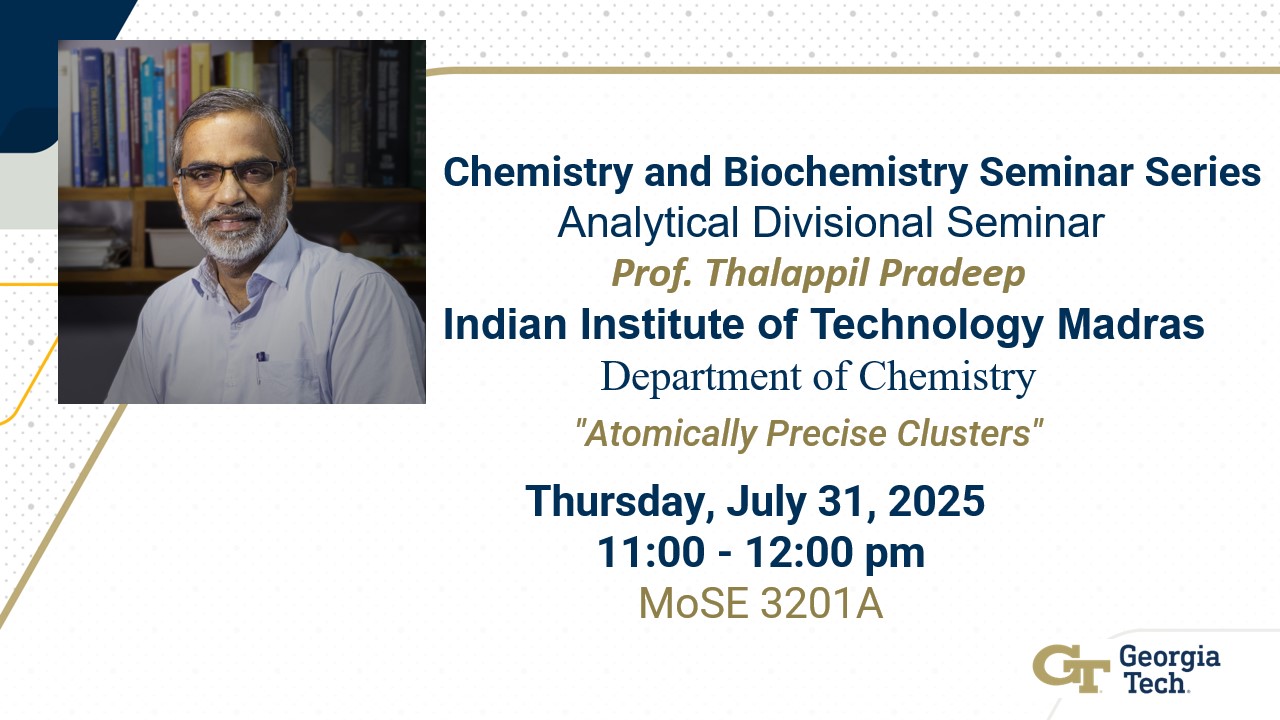
Title: Atomically Precise Clusters
Abstract:
Research in the recent past has resulted in a large number of nanoparticles whose properties depend on the number and spatial arrangement of their constituent atoms. This distinct atom-dependence of properties is particularly noticeable in ligand protected atomically precise clusters of noble metals, which I will refer to as nanomolecules in this lecture. They behave indeed like molecules as revealed most elegantly by mass spectrometry. They show unusual properties such as luminescence in the visible and near-infrared regions. Their molecule-like behaviour is evident from their atom- and structure conserving-chemical reactions. Several clusters, which are archetypal nanoparticles, Ag25(SR)18 and Au25(SR)18 (-SR = alkyl/aryl thiolate) have been used for such reactions. Despite their geometric robustness and electronic stability, reactions between them in solution at room temperature produce alloys AgmAun(SR)18 (m+n = 25), keeping their M25(SR)18 composition, structure and topology intact. We captured one of the earliest events of the process, namely the formation of the dianionic adduct, [Ag25Au25(SR)36]2-, by electrospray ionization mass spectrometry. Exploring this science further, we have studied rapid solution state exchange dynamics in nanoscale pieces of matter, taking isotopically pure atomically precise clusters as examples. As two isotopically pure silver clusters made of 107Ag and 109Ag are mixed, an isotopically mixed cluster of the same entity is formed, similar to the formation of HDO, from H2O and D2O. This spontaneous process is driven by the entropy of mixing and involves events at multiple timescales. Numerous new ‘molecules’ of this kind have been synthesised in the recent past and they have been taken to practical applications. This work is closely connected to the mission of “clean water for all using advanced materials”. Glimpses of this work will also be presented.
Bio:
Thalappil Pradeep is an Institute Professor at the Indian Institute of Technology Madras (IITM), Chennai, India. He is the Deepak Parekh Institute Chair Professor and is also a Professor of Chemistry. He studied at the University of Calicut, Indian Institute of Science (IISc), UC Berkeley, and Purdue. His research interests are in molecular and nanoscale materials. He is an author of over 570 scientific papers in journals and is an inventor of over 100 issued patents. He is involved in the development of affordable technologies for drinking water purification and some of them have been commercialized. His pesticide removal technology has reached about 10 million people. His arsenic removal technology, approved for national implementation, is delivering arsenic free water to about 1.3 million people every day. Along with his associates, he has incubated seven companies and three of them have production units. He is the recipient of several awards including the Shanti Swaroop Bhatnagar Prize, BM Birla Science Prize, National Award for Nanoscience and Nanotechnology, India Nanotech Innovation Award, JC Bose National Fellowship and National Water Award. He has won The World Academy of Sciences (TWAS) prize in Chemistry for the year 2018. Nation conferred the civilian award, Padma Shri on him in 2020. He is also a recipient of the Nikkei Asia Prize, Prince Sultan Bin Abdulaziz International Prize for Water, VinFuture Prize and ENI award. Recently, he has won the International Excellence Award of Karlsruhe Institute of Technology, Germany and the Fellowship of Schroff Foundation. He is a Fellow of all the science and engineering academies of India, TWAS, American Association for the Advancement of Science, African Academy of Sciences, US National Academy of Engineering and Academia Europaea. He has authored the introductory textbook, Nano: The Essentials (McGraw-Hill) and is an author of the monograph, Nanofluids (Wiley-Interscience) and an advanced textbook, A Textbook of Nanoscience and Nanotechnology (McGraw-Hill). He is/was on the editorial boards of journals such as ACS Nano, Chemistry of Materials, Analytical Chemistry, Chemical Communications, Nanoscale, JPC Letters, etc., and was an associate editor of ACS Sustainable Chemistry & Engineering for ten years. He is now an Associate Editor of ACS Sustainable Resource Management. He has authored popular science books in English and Malayalam and is a recipient of Kerala Sahitya Akademi Award for knowledge literature. He has received the Lifetime Achievement Research Award of IITM and Distinguished Alumnus Award of IISc. As part of philanthropy, he supports a school in his village where 500 students are on rolls.